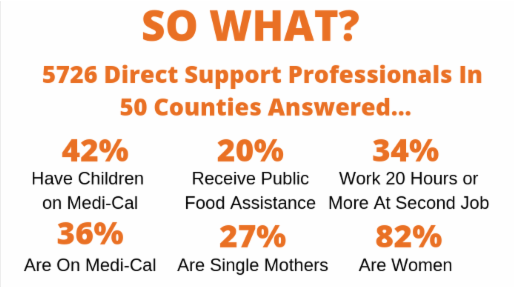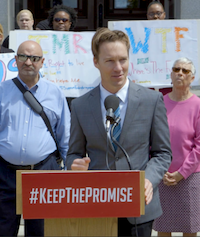By Jordan Lindsey, Executive Director, The Arc of California / UCP California Collaborative
Californians with disabilities aren’t being supported to find jobs or participate in the community because there aren’t enough direct support professionals (DSP) in the workforce. Parents and family members are forced to quit their jobs as a result. Regional centers can’t hire enough service coordinators to help find additional services for the individuals they serve and their family. And the reimbursement rates that fund all of this are in desperate need of updates to ensure outcomes are aligned with incentives.
This is the backdrop for California’s developmental disability community as the 2024 state legislative season begins and Governor Gavin Newsom prepares to release his 2024-25 proposed state budget on January 10th. In response, The Lanterman Coalition, representing tens of thousands of stakeholders in California’s intellectual and developmental disabilities (IDD) community, has proposed three strategies to ensure a viable and sustainable I/DD support system. They are:
- Regional Center Capacity. Update and keep current regional center staff funding to bring California into compliance with federal commitments on caseload ratios.
- Workforce Capacity. Honor the commitment to fully implement the rate models on July 1, 2024. Update the rate models to 2024 costs (including consideration of new state wage floors for competing industries) prior to implementation. Standardize an annual adjustment so that individuals continue to have access to the direct care staff on whom they depend.
- Align Rate Structure with Desired Outcomes. Rate reform is underway and there are areas that need refinement to avoid unintended, potentially harmful repercussions to people with IDD. Solutions include: 1) Maintaining current billing units instead of transitioning to hourly units; 2) Developing sustainable transportation rates; 3) Incentivizing competitive individual employment; 4) Expanding affordable housing options; and, 5) Including innovative services, maintaining appropriate staff credentials, and fairly measuring outcomes.
As a member of The Lanterman Coalition, The Arc & UCP California Collaborative will closely review the proposals in the Governor’s budget and publish a summary of its impacts to Californians with disabilities and their families. Additionally, The Arc & UCP California Collaborative will work with our Coalition partners to develop an advocacy strategy that will include actions both locally and statewide.
Our voices will only be heard if there are thousands of disability advocates across the state raising their voices together. Sign up now to receive updates on this year’s actions, and be sure to share the sign-up form with your community.
Click HERE to view and download the 2024 Lanterman Coalition public policy priorities.






